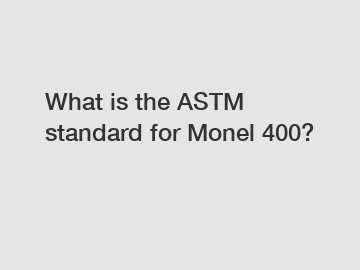What is the ASTM standard for Monel 400?
When it comes to materials used in various industries, the ASTM standards play a crucial role in ensuring quality, reliability, and safety. Monel 400 is a popular choice for many applications due to its excellent resistance to a variety of corrosive environments. But what exactly is the ASTM standard for Monel 400, and why is it important?
Monel 400 is a nickel-copper alloy that offers high strength and excellent resistance to corrosion in a wide range of environments, including seawater, sulfuric acid, and alkalies. It is commonly used in marine engineering, chemical processing, and electronic components, among other applications. In order to ensure that Monel 400 meets certain quality standards, the ASTM has established a set of guidelines and specifications for this material.
The ASTM standard for Monel 400 is ASTM B127. This standard covers the requirements for the material composition, mechanical properties, and dimensional tolerances of Monel 400 plates, sheets, and strips. By adhering to the guidelines set forth in ASTM B127, manufacturers can ensure that their Monel 400 products are of high quality and meet the necessary specifications for their intended application.

One of the key aspects of the ASTM standard for Monel 400 is the material composition. Monel 400 is composed of approximately 67% nickel and 30% copper, with small amounts of iron, manganese, silicon, and carbon. The precise composition of Monel 400 is crucial in determining its mechanical properties and corrosion resistance, making it essential for manufacturers to carefully control the alloying elements in their production process.
In addition to material composition, the ASTM standard for Monel 400 also specifies the mechanical properties that this material must exhibit. These properties include tensile strength, yield strength, elongation, and hardness. By testing Monel 400 samples according to the procedures outlined in ASTM B127, manufacturers can ensure that their products meet the required mechanical properties for their intended application.
Dimensional tolerances are another important aspect of the ASTM standard for Monel 400. This standard includes guidelines for the thickness, width, and length of Monel 400 plates, sheets, and strips. By adhering to these tolerances, manufacturers can ensure that their products are consistent in size and shape, making them easier to work with and ensuring a high level of quality and reliability.
Overall, the ASTM standard for Monel 400 plays a crucial role in ensuring the quality and reliability of this popular nickel-copper alloy. By following the guidelines set forth in ASTM B127, manufacturers can produce Monel 400 products that meet the necessary specifications for their intended application, providing customers with a material that offers excellent corrosion resistance and mechanical properties.
In conclusion, the ASTM standard for Monel 400 is an essential framework that guides manufacturers in the production of high-quality nickel-copper alloy products. By adhering to this standard, manufacturers can ensure that their Monel 400 products meet the necessary material composition, mechanical properties, and dimensional tolerances for their intended application. Whether used in marine engineering, chemical processing, or electronic components, Monel 400 that meets the ASTM standard is sure to provide excellent performance and reliability in a wide range of corrosive environments.
If you want to learn more, please visit our website Plain Weave Duplex Stainless Steel Woven Mesh, Nickel-Chromium Woven Mesh, Corrosion Resistant Monel Alloy Wire.

Comments